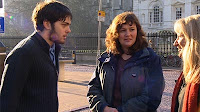From A Woman's Perspective:
A young lady who has participated for several years in a social group for adults with high functioning autism and Asperger’s Syndrome sponsored at our TEACCH Center in Asheville, recently remarked, “There aren’t a heck of a lot of ladies who have Asperger’s Syndrome or autism. The majority are males, and although we get along with the guys, there are some issues that they are never going to understand. I wish there was more information specifically for ladies who have autism.” Her comment prompted the initiation of the first ladies’ group at the Asheville TEACCH Center.
While talking with this lady, who is in her 20’s, I was reminded of my own early adulthood. I remember the strong support of “ladies’ consciousness-raising groups” that sprouted up on college campuses and in living rooms in the 60’s and 70’s. While struggling for and demanding equality between the sexes in the society at large, we discovered that there were important distinctions that needed to be honored. Together we explored and defined what “being a lady” was about, in the company of other young ladies searching for self-awareness. Being a member of a ladies’ “CR” (Consciousness-Raising) group was educational, exciting, exhilarating, emotional, relevant…and never boring.
According to Tony Attwood and other professionals in the field, ladies with high functioning autism and Asperger’s Syndrome may be an under diagnosed population. If this is true, some of the reasons may be attributed to gender differences.
Are there behaviors that are seen in females with Asperger’s Syndrome, but not in males, that we haven’t yet identified as part of the profile… or certain gender-related behavior that might fool us into ruling out the diagnosis? What about the “pretend play” that has been observed in many young females at our center, which on the surface appears to be quite creative and imaginative? There seem to be many females (on the spectrum) who are enamored with princesses, fantasy kingdoms, unicorns, and animals¬¬. How many diagnosticians observe these interests and skills as imagination, and rule out a diagnosis based on these behaviors? Might this interest in imaginary kingdoms and talking animals be more common among females than males, yet still exist alongside other autistic/Aspergers traits?
And what about one typical response to confusion or frustration--hitting or other such outward expressions of frustration? Does this type of acting out occur more often in males with autism than in females? Is confusion or frustration simply easier to identify in males than females because we already look for it? Among the general population, it is commonly thought that males do “act out” more than females. (You sometimes hear teachers complain there are too many males in his or her class, and its impact on the class’ personality!) Is it easier to identify males as having autism because these behaviors are more obvious, than females who may experience inward or passive signs of aggression?
Professionals whose task it is to diagnose individuals with autism or Asperger’s Syndrome need to learn more about the full range of qualities and personality differences unique to females and ladies on the spectrum.
And what about the females’ and ladies’ route to self-understanding? Indeed, several ladies I have worked with who have Asperger’s Syndrome have talked about the unique challenges they experience because they constitute a “minority” within this special group of society.
I believe that in order to gain self understanding, each person with - or without - autism needs to see his or her own reflection in the world. I call this ‘seeing one’s place.’ For people with autism or AS, who already are challenged in this area, it becomes imperative that they meet, listen to, talk with, read about, and learn from others with autism. What happens as a result of this coming together is that they are able to see their ‘reflection’ and better understand their own unique styles of thinking and being. Ladies with autism, although benefiting greatly from getting to know other people with autism, often find that they might be the only female (or one of a very few ladies) in the group.
When I asked the ladies we see at our center if they would be interested in being in a ladies’ group, I had hoped that the group could fill a gap in our services. I also hoped that I would learn more about what it means to be a lady with autism. The more I meet with these ladies, the more I realize we have far to go in understanding the unique challenges that ladies with autism or Aspergers face.
One lady explained that, from her perspective there is subtle interaction between two sets of issues. “Problems related to the [autism] spectrum are combined with problems of society’s expectations of ladies. How one looks, what one wears, how one is supposed to relate socially, that a lady is supposed to have a natural empathy towards others, expectations about dating and marriage…” Ladies are affected by autism in the same ways as are their male counterparts; however, they are doubly challenged by the added assumptions that society places on the female gender.
At the risk of stereotyping, any man who is a rational thinker, and not emotionally in tune with others, is often thought of as having “typical male behavior” (think of the TV show “Tool Time”). A female exhibiting these same personality traits might be regarded as odd, annoying, cold, or depending on the situation, even mean-spirited. Autism, with its particular effects on personality, causes one to appear more rational and less emotionally responsive or empathetic to others. Ladies with autism note that these expectations indeed may weigh more heavily on them, just because they are ladies.
At the first meeting, the group members requested specific topics for discussion, topics that they encounter in daily life or ones which they are currently pondering. These topics included issues that are relevant to ladies at large such as personal safety; dating and sex; or being taken advantage of when your car needs repair. Other issues they raised were felt by group members to possibly be more significant for ladies with autism, but common to all--being pressured to conform by getting married; to “act like a lady”; and issues about one’s appearance--to have to “look a certain way”.
However, there were topics that all agree are a direct result of being a lady with autism, such as common behavioral and social expectations by the society at large. At the top of the list were the expectations of being sensitive to others and displaying empathy.
Ladies with autism have expressed that they feel that more is expected from them than from their male counterparts, simply because of their gender. Members of the group felt these expectations to be sensitive and empathetic, typically attributed to ladies, are unfair and difficult to meet. Discussion centered on how these behaviors require skills like the ability to accurately read and respond to body language, along with the inherent desire to “take care of others, emotionally”. Interestingly, after discussing these issues, the first requested topic to explore was reading body language and how to tell if someone is trying to take advantage of you.
The topic that generated the biggest emotional response from the group was the personal experience of feeling like one was “being treated like a child”. Parents, in general, are often more protective of their daughters than their sons. Daughters with autism talked about feeling overly protected into womanhood. In many cases, this is needed, although without understanding the parent’s perspective, the adult daughter can feel unfairly babied. Some ladies talked about the resentment they felt toward people, who for many years had been trying to teach them “socially appropriate” ways of acting. “Enough already!” was a common response.
The desire to be respected as an individual, and as a lady, was voiced clearly and strongly. Although this desire is probably equally shared among grown men with autism, the ladies voiced these desires clearly, with deep emotion and passion, when talking with other ladies.
 There is a great deal of confusion when it comes to the differences between Aspergers (high functioning autism) and Autistic Disorder. It seems that even medical professionals have difficulty determining a clear line between the two disorders. Often, it boils down to simply categorizing children according to the specific traits they exhibit, such as how they use language. However, there are some professionals who assert that Aspergers and Autism are actually the same disorder and should both fall under the heading of Autism.
There is a great deal of confusion when it comes to the differences between Aspergers (high functioning autism) and Autistic Disorder. It seems that even medical professionals have difficulty determining a clear line between the two disorders. Often, it boils down to simply categorizing children according to the specific traits they exhibit, such as how they use language. However, there are some professionals who assert that Aspergers and Autism are actually the same disorder and should both fall under the heading of Autism.



.jpg)


